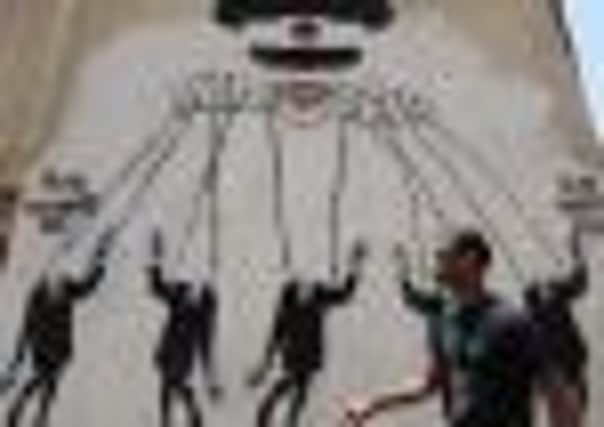Hardline Islamists say ruling Egypt will bring about a new caliphate


“We are seeing the dream of the Islamic Caliphate coming true at the hands of Mohammed Morsi,” Safwat Hegazy blared from his podium.
“The capital of the caliphate and the United Arab States is Jerusalem, God willing,” he added, as thousands cheered and waved the Brotherhood’s green flag, chanting, “The people want to implement God’s law.”
Advertisement
Hide AdAdvertisement
Hide AdOn the campaign trail for the presidential election, now only eight days away, the Muslim Brotherhood has become bolder in saying it wants to bring a state where religion and Islamic law play a major role – and insisting that it has the right to rule.
As a result, it has moved away from the more moderate face that it promoted since even before the fall of Hosni Mubarak 15 months ago.
During campaigning for last year’s parliament elections, the Brotherhood insisted that implementing Islamic law was not its immediate priority, instead speaking vaguely of an “Islamic background” to government.
Critics and former Brotherhood members say the greater assertiveness represents the 82-year-old group’s true face, brought by hard-liners who over the past decades have squeezed out moderates and taken control of its leadership.
Its initial candidate for president, deputy leader Khairat el-Shater, was disqualified from the race because of a Mubarak-era conviction. That forced them to turn to Mr Morsi, seen as a weaker candidate. He has struggled to rally religious voters behind him in the face of competition by Abdel-Moneim Abolfotoh, a more moderate Islamist.
Mr Morsi has lagged in polls, generally in fourth place in a field of 13 candidates for the 23-24 May first round of elections.
Whatever the reasons for this, the group no longer avoids questions of implementing Islamic Shariah law. “We will not accept any alternative to Shariah … The Koran is our constitution and it will always be so,” Mr Morsi told a crowd of supporters at a Cairo University rally.
In an interview this week, Mr Shater – who appears alongside Mr Morsi on the campaign trail so often critics say he would be shadow president – said laws must conform with Shariah. He said the Brotherhood would stipulate that officials tasked with reforming Egypt’s economy, politics, media and other sectors also had religious expertise. For example, Mr Shater said that a law giving women the right to seek divorce should be reviewed because it had been influenced by Mr Mubarak’s wife Suzanne – who he said had a policy of “siding with women in any conflict with men”.
Advertisement
Hide AdAdvertisement
Hide AdLast week, the Brotherhood’s MPs objected to a World Bank loan allocated to improve Egypt’s battered sewage system because it would involve interest, which is banned under Shariah.
A string of recent moves by the Brotherhood to flex its power alienated moderates, even among its supporters, who felt it was going too far.
The group demanded that the military allow it to form a government, even going so far as to freeze parliament for several days in protest when the generals refused. The Brotherhood and other Islamists tried to pack a committee tasked with writing the next constitution with their own followers – only to have liberals on the panel revolt.
Tarek el-Bishri, a former judge seen as sympathetic to the Brotherhood, washed his hands of it in an article this week.
He wrote: “It is using its legislative power not to serve the national interest, but to serve the party and a handful of individuals’ interests.
“As a former judge, I am screaming and ask others to scream against this behaviour, to clear my conscious before God.”